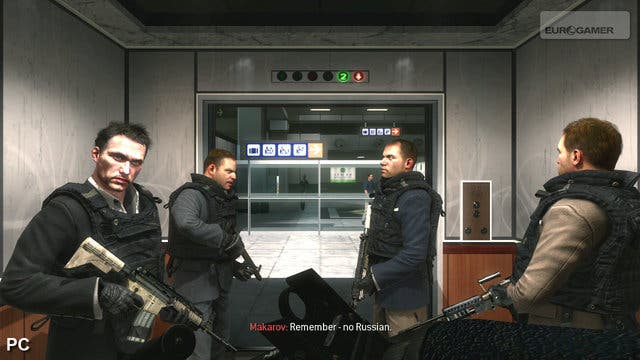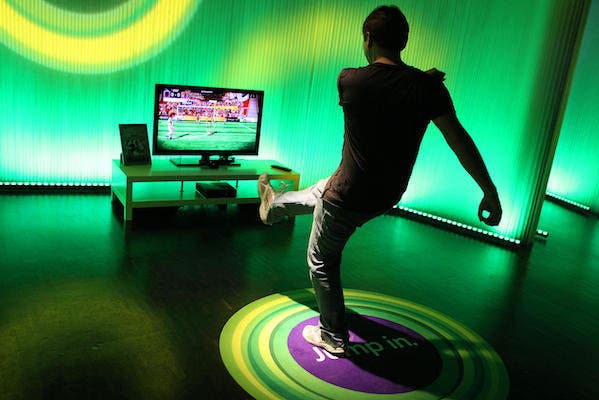Just one more go...
Eurogamer quizzes Panorama on addiction special.
But for Onono, it's an issue the industry cannot ignore. "One of the things the games industry says is that personal situations that lead to these addictions – but that's a fact of all addictions. The truth is nobody really knows and that's kind of what we're pushing.
"The main thing that struck me is the way [the games industry] compares computer games to TV and reading a book," he adds. "I think computer games are engrossing in a way that other forms of entertainment can only aspire to.
"There are positive things that can come from playing games – the issue is the lack of knowledge as to the potential dangers."
Speaking in the film Griffiths argues, "It's so new people don't see it as an important research area to look into. My research has consistently shown that people display the signs and symptoms associated with more traditional addictions."
The BBC could not be accused of underplaying the link it is seeking to draw between gaming and addiction. The programme synopsis promises, somewhat dramatically, that the show will reveal "the hidden psychological devices in games that are designed to keep us coming back for more".
"Some games are designed in a manner that you just don't want to leave," says Adrian Hon, of social games developer Six To Start. Well, yes. That's the point.
But as Griffiths goes on to explain: "If you've got that vulnerability to an addiction, that will keep you in the game far in excess of what the normal person would do."

Hon adds: "I think people don't necessary understand how powerful some game mechanics can be." This seems to be the crux of Panorama's argument: non-gamers, especially parents, do not understand the medium and therefore lack the means to spot a problem as one is developing.
Mrs Dando angrily pleads with the games industry to "think about the fact that people do become addicted". This is after she allowed her son, living under the same roof, to play World of Warcraft, by his own admission, for up to 20 hours per day. The matter of parental responsibility must surely come into play.
Onono agrees: "Absolutely. It's a half-hour film so you can't touch on everything, but there is an issue here. Games have moved on so quickly and many parents just don't understand."
He reveals that the crew spoke to Mrs Dando about her son's gaming habit. She claimed she "had no idea that a computer could be used in that way".
"It's common sense," he says. "But common sense for people like you or me who know a bit about it. This is quite difficult for somebody for whom this world has appeared from absolutely nowhere; they don't understand it."
The Panorama reporter, Rowe, criticises UKIE towards the end of the film for not providing more information to consumers on the potential risks via its website, and remains unconvinced by the industry's response.
He states in a voiceover: "It remains to be seen how serious the industry is about funding the research that needs to be done. Until that happens, parents won't know about potential dangers in their homes."

UKIE's response is to suggest that any new research should "ideally be independent of the games industry". Would people have taken the Byron Review seriously, for instance, if games companies had funded it?
Rowe – reporting from Eurogamer Expo – ends with a broadly positive, sensible statement about gaming. "It's easy to forget the benefits and sheer joy [games] bring," he says, over shots of people playing Kinect games. "I don't want to stop my son from gaming, but I'm going to keep an extra close eye on him to ensure he games safely."
UKIE director-general Michael Rawlinson takes up this point earlier in the piece, explaining that, the issue of addiction aside, games can "boost intelligence, reduce stress, and be valuable learning tools - something passive media like television would do well to emulate".
Opinion will be divided over the way Panorama has chosen to highlight the issue, but Onono does not believe the documentary creates a false impression of the industry.
"I think we do make it clear that games are safe and good for you," he says. "We make it clear at the end that games should be played safely, especially with kids.
"A film about addiction is by its very nature a negative subject and that's what we were investigating. It's quite difficult to get away from that and we tried to make it very clear.
"I'm sure people will say we could have made it clearer in other ways, but we did go out of our way to say that games are good."
Tonight's edition of Panorama will be broadcast at 8.30pm on BBC 1 and will be available afterwards to UK viewers on iPlayer.
